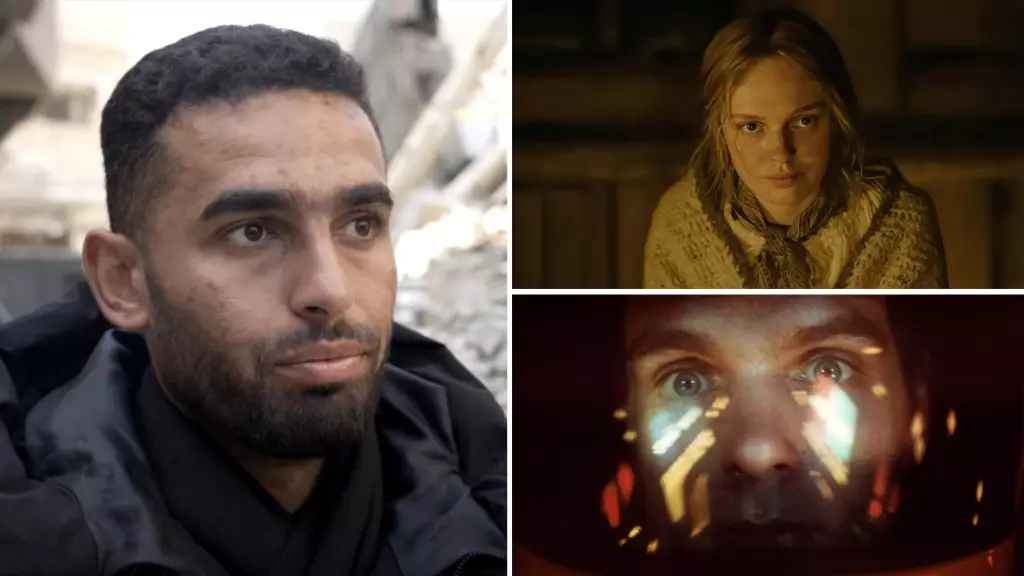As the film industry gears up for the prestigious awards season, “From Ground Zero,” a poignant documentary hailing from Palestine, emerges as a strong Oscar contender for Best International Feature. With its release at approximately 70 AMC locations across top metropolitan areas and select independent theaters, including prominent venues in New York’s Quad and Los Angeles’ Laemmle Royal, the film demands attention not merely for its classification but for the depth of its narrative. Directed by Rashid Masharawi, a Gaza native now residing in France, this documentary takes the form of 22 video diaries crafted by various Palestinian filmmakers. This initiative seeks to provide an authentic portrayal of daily life in Gaza, highlighting the struggles of families trying to maintain a semblance of normalcy amidst relentless Israeli bombardments.
What sets “From Ground Zero” apart is its conscious decision to eschew political rhetoric in favor of personal storytelling. This approach offers a unique perspective—one that emphasizes human resilience in the face of horror. The film captures fleeting moments of joy and normality amidst the backdrop of chaos, painting a complex picture of survival. In the face of horror, these narratives reveal not only suffering but also the enduring strength of the human spirit. “The U.S. theatrical release of From Ground Zero is a pivotal moment for this film and for the stories it carries,” Masharawi has noted, referring to the documentary as “an unfiltered window into the resilience, creativity, and humanity of those living through unimaginable hardship.”
The ambitious release strategy adopted by Watermelon Pictures and its parent company, MPI Media, is noteworthy. With Oscar voting looming just a week away, the decision to debut the film was not without risk. The crowded market, teeming with studio releases and indie projects, poses challenges for any film seeking to carve a niche for itself. However, with the backing of a prominent distributor and a focus on communities with sizable Palestinian populations—such as Chicago and Detroit—the film stands poised to make significant inroads during this critical awards season.
In addition to “From Ground Zero,” another film making waves is “The Damned,” a horror-thriller directed by Thordur Palsson, which opens on 732 screens. This feature debut tells the story of Eve, portrayed by Odessa Young, a widow facing harrowing moral dilemmas when a shipwreck occurs in her isolated Icelandic fishing village during a brutal winter. As resources dwindle, the fine line between altruism and self-preservation becomes blurred. Faced with gut-wrenching choices, the community wrestles with guilt and dread, reflecting on the repercussions of their decisions.
What stands out about “The Damned” is its exploration of human nature in adverse conditions. Unlike typical horror narratives steeped in supernatural elements, this film taps into the psychological tension of survival ethics. With a cast that includes Joe Cole and Siobhan Finneran, “The Damned” presents a gripping portrayal of how isolation and desperation can reshape moral frameworks. Similarly to “From Ground Zero,” it delves into what it means to be human under extraordinary circumstances, albeit through a lens of mythologized horror.
In an era dominated by technological advancements and an overwhelming focus on artificial intelligence, New York City’s Film Forum offers a timely retrospective titled “From Metropolis to Ex Machina.” This three-week event, curated by Bruce Goldstein, examines the cinematic treatment of AI spanning nearly a century. Featuring 30 films including seminal works like Fritz Lang’s “Metropolis” and Stanley Kubrick’s “2001: A Space Odyssey,” the festival explores how cinema has long warned us of the potential ramifications of creating intelligent machines.
Goldstein’s thoughtful curation acknowledges the shift in public perception about AI—once viewed primarily as an exciting technological frontier, now often seen through a lens of caution and unease. It’s interesting to note how films have showcased AI, oscillating between endearing constructs like Wall-E and terrifying entities such as HAL 9000 from “2001: A Space Odyssey.” The retrospective ultimately seeks to reflect society’s evolving relationship with technology; or more accurately, our anxieties about it.
As the conversation around AI continues to develop, this festival underscores a critical inquiry: will our creations complement our existence, or will they forewarn our downfall? With movies delving into themes of machine intelligence long before AI entered common parlance, “From Metropolis to Ex Machina” serves as a reminder of the perennial fears and philosophical dilemmas surrounding our increasingly intertwined futures.
As these films penetrate the cultural consciousness, they not only provide entertainment but also stimulate important discussions about human resilience and the implications of our technological choices. “From Ground Zero” invites audiences to empathize with lives shadowed by conflict, while “The Damned” prompts us to consider the weight of survival. Conversely, the AI retrospective engages viewers with the cautionary tales of our cinematic past.
In tandem, these narratives cultivate a richer understanding of resilience and the moral complexities we navigate in an ever-evolving world. As the awards season unfolds, it is crucial to approach these stories not merely as entertainment but as reflections of the human experience in times of strife and uncertainty.

